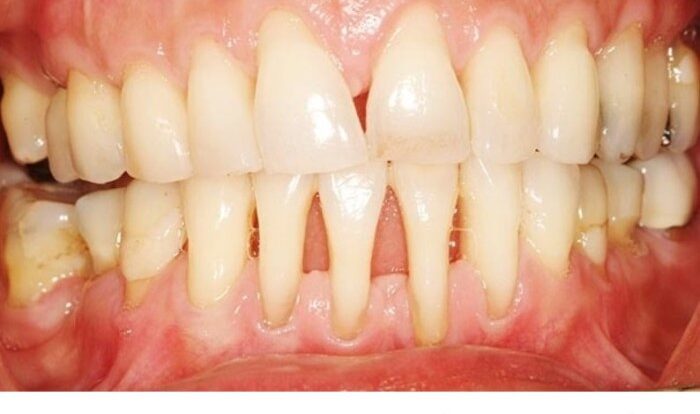
Gum disease, a common problem, can lead to pain, bleeding, and even tooth loss. But fear not! This guide will equip you with everything you need to know about how to cure gum disease without a dentist. From natural remedies to home care techniques, dietary changes, and alternative therapies, we’ve got you covered.
Read on to discover the secrets of maintaining a healthy smile, even without regular dental visits.
Natural Remedies for Gum Disease
Gum disease, also known as periodontal disease, is a common condition that affects the gums and the bones that support the teeth. It can be caused by a variety of factors, including poor oral hygiene, smoking, and certain medical conditions.
Gum disease can lead to a number of problems, including bleeding gums, pain, and tooth loss.
There are a number of natural remedies that can be used to treat gum disease. These remedies can help to reduce inflammation, kill bacteria, and promote healing. However, it is important to note that these remedies are not a substitute for professional dental care.
If you have gum disease, it is important to see a dentist to get a proper diagnosis and treatment plan.
Benefits of Natural Remedies for Gum Disease
- Can help to reduce inflammation
- Can help to kill bacteria
- Can help to promote healing
- Are often less expensive than traditional treatments
- Can be used in conjunction with traditional treatments
Effectiveness of Different Natural Remedies
| Remedy | Effectiveness | Side Effects |
|---|---|---|
| Tea tree oil | Effective against a wide range of bacteria | Can cause skin irritation |
| Coconut oil | Effective against some bacteria and fungi | Can be comedogenic (clog pores) |
| Turmeric | Effective against inflammation and bacteria | Can stain teeth |
Potential Side Effects and Contraindications
Some natural remedies can have side effects, especially if they are used in large amounts or for a long period of time. It is important to talk to your doctor before using any natural remedies, especially if you are pregnant, breastfeeding, or have any other health conditions.
Some of the potential side effects of natural remedies for gum disease include:
- Skin irritation
- Nausea
- Vomiting
- Diarrhea
- Headache
Some natural remedies may also interact with certain medications. It is important to talk to your doctor before using any natural remedies if you are taking any medications.
Home Care Techniques for Gum Disease
Gum disease is a common problem that can lead to serious health issues if left untreated. Fortunately, there are a number of home care techniques that can help prevent and treat gum disease.
Proper brushing and flossing are essential for preventing and treating gum disease. When you brush your teeth, be sure to use a soft-bristled toothbrush and gentle circular motions. Brush for at least two minutes, twice a day. Flossing is also important for removing plaque and bacteria from between your teeth.
Floss at least once a day, using a gentle sawing motion.
Using mouthwash and other oral hygiene products can also help prevent and treat gum disease. Mouthwash can help kill bacteria and reduce inflammation. Other oral hygiene products, such as toothpaste and dental floss, can also help keep your teeth and gums healthy.
In addition to brushing, flossing, and using mouthwash, you can also perform a dental cleaning at home. To do this, you will need a dental scaler, a dental mirror, and a toothbrush. First, use the dental scaler to remove any plaque or tartar from your teeth.
Then, use the dental mirror to check for any areas that you missed. Finally, brush your teeth with a toothbrush to remove any remaining plaque or bacteria.
By following these home care techniques, you can help prevent and treat gum disease and keep your teeth and gums healthy.
Brushing and Flossing Techniques
Proper brushing and flossing are essential for preventing and treating gum disease. When you brush your teeth, be sure to use a soft-bristled toothbrush and gentle circular motions. Brush for at least two minutes, twice a day. Flossing is also important for removing plaque and bacteria from between your teeth.
Floss at least once a day, using a gentle sawing motion.
Mouthwash and Other Oral Hygiene Products
Using mouthwash and other oral hygiene products can also help prevent and treat gum disease. Mouthwash can help kill bacteria and reduce inflammation. Other oral hygiene products, such as toothpaste and dental floss, can also help keep your teeth and gums healthy.
Home Dental Cleaning
In addition to brushing, flossing, and using mouthwash, you can also perform a dental cleaning at home. To do this, you will need a dental scaler, a dental mirror, and a toothbrush. First, use the dental scaler to remove any plaque or tartar from your teeth.
Then, use the dental mirror to check for any areas that you missed. Finally, brush your teeth with a toothbrush to remove any remaining plaque or bacteria.
Dietary Changes for Gum Disease

Maintaining good gum health is not only about brushing and flossing regularly, but also about making healthy dietary choices. The nutrients you consume play a crucial role in supporting the health of your gums and preventing gum disease.
Consuming a balanced diet rich in vitamins, minerals, and antioxidants can help strengthen your gums, reduce inflammation, and promote overall oral health. Conversely, certain foods can contribute to gum disease and should be limited or avoided.
Foods that Promote Gum Health
- Fruits and Vegetables:Rich in antioxidants and vitamins, fruits and vegetables help fight inflammation and support gum health. Examples include berries, leafy greens, and citrus fruits.
- Whole Grains:Whole grains provide fiber, which helps maintain a healthy gut microbiome. A healthy gut is linked to improved immune function and reduced inflammation, which can benefit gum health.
- Lean Protein:Lean protein sources, such as fish, chicken, and beans, provide essential amino acids that support tissue repair and gum health.
- Dairy Products:Dairy products contain calcium, which is essential for strong bones and teeth. They also contain probiotics, which support a healthy gut microbiome.
Foods to Avoid
- Sugary Foods and Drinks:Sugar feeds bacteria in the mouth, leading to plaque formation and gum inflammation. Limit sugary snacks, sodas, and processed foods.
- Sticky Foods:Sticky foods, such as candy and caramel, can stick to teeth and create a breeding ground for bacteria. Avoid these foods or brush your teeth after consuming them.
- Acidic Foods:Acidic foods, such as citrus fruits and vinegar, can erode tooth enamel and contribute to gum disease. While fruits are generally beneficial, limit the intake of highly acidic fruits or rinse your mouth with water after consuming them.
Dietary Supplements for Gum Health
In addition to a healthy diet, certain dietary supplements can support gum health:
- Vitamin C:Vitamin C is an antioxidant that supports collagen production, which is essential for healthy gums.
- Coenzyme Q10:Coenzyme Q10 is an antioxidant that helps reduce inflammation and improve gum health.
- Green Tea Extract:Green tea extract contains polyphenols, which have antioxidant and anti-inflammatory properties that can benefit gum health.
Remember that dietary changes alone may not be sufficient to cure gum disease, but they can play a significant role in improving gum health and preventing further damage.
Alternative Therapies for Gum Disease

Conventional treatments for gum disease often involve dental procedures and antibiotics. However, alternative therapies offer a complementary approach, utilizing natural remedies and holistic practices to address the underlying causes of gum disease.
Acupuncture
Acupuncture is a traditional Chinese medicine technique that involves inserting thin needles into specific points on the body. It is believed to stimulate the body’s natural healing mechanisms and improve blood flow to the gums, promoting tissue repair and reducing inflammation.
Herbal Remedies
Certain herbs possess antimicrobial and anti-inflammatory properties that can help treat gum disease. Examples include green tea, chamomile, and myrrh. These herbs can be used as mouthwashes, teas, or supplements to support gum health.
Ozone Therapy
Ozone therapy involves administering ozone gas to the gums. Ozone has antimicrobial effects and can help kill bacteria that contribute to gum disease. However, it is important to note that ozone therapy is still considered an experimental treatment, and its long-term safety and effectiveness require further research.
Comparison of Effectiveness and Risks
The effectiveness of alternative therapies for gum disease varies, and more research is needed to establish their long-term efficacy. However, some studies suggest that acupuncture and herbal remedies may provide adjunctive benefits when combined with conventional treatments.
It is important to note that alternative therapies should not be used as a substitute for regular dental care. Consulting a healthcare professional before using any alternative therapy is essential to ensure its safety and appropriateness for individual needs.
Lifestyle Modifications for Gum Disease: How To Cure Gum Disease Without A Dentist

Gum disease, also known as periodontal disease, is a common problem that can affect people of all ages. It is caused by bacteria that build up on the teeth and gums, and if left untreated, it can lead to serious health problems, including tooth loss.There
are a number of things you can do to improve your gum health, including making some simple lifestyle changes. These changes include:
Smoking
Smoking is one of the worst things you can do for your gum health. The chemicals in cigarettes damage the gums and make them more susceptible to infection. If you smoke, quitting is the best thing you can do for your overall health, including your gums.
Stress, How to cure gum disease without a dentist
Stress can also take a toll on your gum health. When you are stressed, your body produces hormones that can break down the tissues in your gums. This can make them more vulnerable to infection.
Sleep
Getting enough sleep is essential for good overall health, including your gum health. When you sleep, your body produces hormones that help to repair and regenerate tissues. If you do not get enough sleep, your gums may not be able to heal properly from the damage caused by bacteria.
Recommendations for Lifestyle Changes
In addition to quitting smoking, reducing stress, and getting enough sleep, there are a number of other lifestyle changes you can make to improve your gum health. These include:
- Brushing your teeth twice a day with a soft-bristled toothbrush.
- Flossing your teeth once a day.
- Eating a healthy diet that is low in sugar and processed foods.
- Getting regular dental checkups.
Regular Dental Checkups
Regular dental checkups are an important part of maintaining good gum health. Your dentist can check for signs of gum disease and recommend treatment if necessary. They can also provide you with advice on how to improve your oral hygiene and prevent gum disease from developing in the first place.
Summary
Remember, while these home remedies and techniques can provide relief, it’s crucial to consult a healthcare professional if your gum disease persists or worsens. Regular dental checkups are essential for maintaining optimal oral health and preventing future problems.
With the knowledge gained from this guide, you can now take proactive steps towards a healthier, more radiant smile.
FAQ Corner
Can I use salt water to rinse my mouth for gum disease?
Yes, salt water is a natural antiseptic that can help reduce inflammation and kill bacteria. Mix 1/2 teaspoon of salt in a cup of warm water and rinse your mouth for 30 seconds, twice a day.
Is flossing really that important for gum health?
Absolutely! Flossing removes plaque and food particles from between your teeth, where your toothbrush can’t reach. Flossing daily helps prevent gum disease and cavities.





